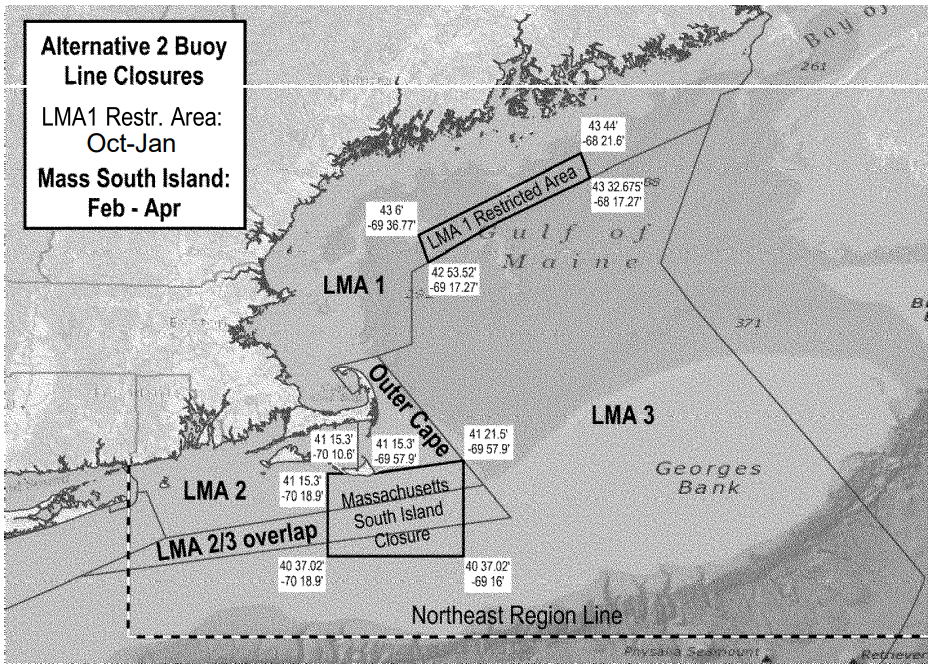(CN) — A group of lobstermen are back out on the water, free to fish a strip of ocean about 30 miles off the coast of Maine after a federal judge stopped the implementation of a federal rule designed to protect the endangered North American right whale.
Describing it as “some of the richest fishing ground in Maine,” U.S. District Judge Lance Walker in Maine issued a temporary restraining order Saturday preventing the National Marine Fisheries Services from closing 967 square miles to most lobster fishing from October to January.
At issue: the buoy lines attached to the lobster traps and other fishing gear have become one of the biggest menaces to whales. Entanglements can lead to injury and death. It is one of the situations threatening the approximately 360 North Atlantic right whales, a decimated population once a prized quarry by the New England whaling industry.
The National Marine Fisheries Service was about to implement a rule Monday that would have prohibited the use of buoy lines in that area, essentially cutting off access to the commercial lobster industry. The service had told the court that 15% of right whales get tangled up in fishing gear in federal waters every year.
But in his 28-page order, Walker ruled in favor of the fishermen who sued over the rule and said the government used “markedly thin statistical modeling” to predict the existence of right whales in the area it hoped to close. The Donald Trump-appointed judge said he wanted more evidence to prove or debunk the claim that the right whales were swimming amongst the buoy lines there.
“While the public interest in this case cuts both ways—pitting a culturally and economically valuable fishery against the preservation of an equally iconic endangered species—it strikes me that there is an overriding public interest in insisting on orderly and epistemically sound rulemaking that members of the public have reason to believe is grounded in reality,” Walker wrote over the weekend.
While Walker questioned the amount of income the lobstermen claimed they may lose, the judge said the impact to two coastal communities would be significant and the lobstermen would spend millions to comply with the regulations.

The order is the latest development in litigation over right whales and Maine’s lobster industry. In late September, the state of Maine intervened in another lawsuit pending in Washington federal court. In a statement, Maine Governor Janet Mills said the outcome of that lawsuit could lead to closure of the state’s lobster fishery.
Jane Davenport, senior attorney with Defenders of Wildlife, said her organization brought the lawsuit along with two other environmental groups in 2018 and amended the complaint last month, alleging National Oceanic and Atmospheric Administration Fisheries made legal errors when it issued its rule and a May 2021 biological opinion regarding right whales.
A third lawsuit is pending in Washington federal court, brought by another lobster industry group.
Meanwhile, Davenport finds the decision out of the Maine federal court disappointing because the agency took into account the lobster industry’s feedback, the whale’s shifting habitat due to global warming and data collected for years.
“This was a highly technical involved decision. The agency didn’t make it lightly,” Davenport said.
Defenders of Wildlife filed a motion to intervene in the Maine litigation on Oct. 4.
Attorney Alfred Frawley IV of the firm McCloskey, Mina, Cunniff & Frawley represents the local union that helped bring the suit on behalf of 50 boats that fish that area. Altogether, about 150 boats operate in the fishing ground, he said.
According to Frawley, the technology exists to better manage the federal fishing grounds than seasonal closures.
“Right now, I can get on my computer and I can figure out where almost every great white shark in the world is this very moment,” Frawley said.
Similar tagging and tracking of right whales, he said, could help the federal government operate a dynamic area management of the waters, closing areas to make way for the whales.
When emailed for comment, a spokesperson for NOAA Fisheries said the agency is assessing the ruling.
Subscribe to Closing Arguments
Sign up for new weekly newsletter Closing Arguments to get the latest about ongoing trials, major litigation and hot cases and rulings in courthouses around the U.S. and the world.









